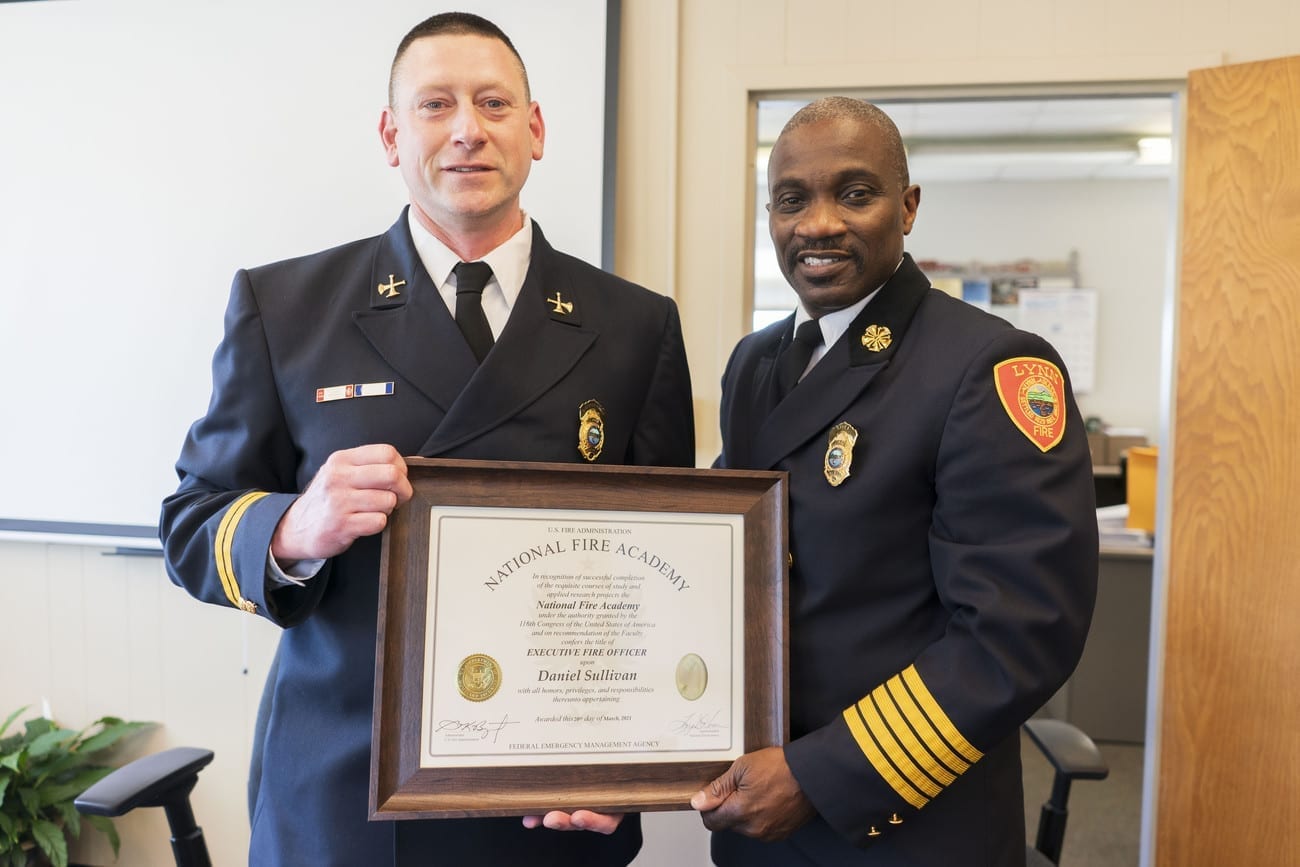LYNN — Lynn Fire District Chief Daniel Sullivan was honored during a virtual graduation ceremony on Monday night for completing the Executive Fire Officer Program (EFOP), a prestigious accomplishment for a senior fire officer.
The EFOP is the flagship program of the National Fire Academy, which provides senior fire officers with a broad perspective on various facets of fire and emergency medical services (EMS) administration.
Sullivan’s wife, Mary, and Lynn Fire Chief Stephen Archer presented Sullivan with his official certificate of completion.
“It’s really a big deal, it really is,” said Archer. “It’s not a surprise if you know Dan. I’ve had the pleasure of watching him come along as he moved up in rank. One of the things you see from him from the earliest time is his commitment to learning and to bettering himself.”
To obtain the certificate, participants had to apply for the four-year program, which consists of courses and research which examines how to implement leadership in situations that present difficult or unique problems within communities.
Only about 4,000 people have graduated from this program since its inception about 30 years ago, with about 300 of those being from Massachusetts.
During this program, Sullivan visited the National Fire Academy (NFA) in Emmitsburg, Md. for two weeks each year, where he participated in workshops and group work. After that, he would spend the next three to six months networking and working on research projects on topics such as large-scale emergency planning and mental health.
“I loved it,” Sullivan said. “In the beginning, none of us wanted to do a research project but I took it to heart.”
After his research project on mental health awareness, Sullivan said he brought it back to the department and delivered a training program that will “save lives.”
All of the research projects completed in the EFOP are then uploaded to the NFA library on its website for anyone to view. Archer said this is a significant resource because, with any of the problems they have within the department, it is likely another department with similar demographics and size had the same issue.
“You take what applies to your community,” said Archer. “Not everyone operates the same way, but you take what applies and then just mold it.”
Years one and two of the program focused on leadership, while year two focused on risk reduction for the community, and year three focused on emergency management such as hurricanes and ammonia leaks.
Sullivan said he learned a lot from working with other people in the program who were firefighters across the country from the state of Washington to Pennsylvania.
Archer said Sullivan’s skills have been amplified through this program and are a huge asset to the department.
“The whole department and the city are the beneficiaries of his drive and commitment to excel all the time,” Archer said. “He’s always going to be learning and improving because that’s just the kind of guy he is.”
Sullivan said he is already looking and applying for other programs he can join because he loved the education, which he said was rigorous, and really enjoys expanding his knowledge.
“He’s sad that it’s over,” his wife, Mary, said. “He said he’s ready to go back to something else.”
Sullivan said a very small percentage of people join and finish programs like this because the commitment and work is intense. The research projects that he completed were anywhere from 70 to 100 pages.
“All of the knowledge and expertise that he’s gained — not only through the program but through his own research — is stuff he has now that can benefit this department. He brings that with him everytime he comes to work,” Archer said. “I intend to utilize that to the fullest.”
Allysha Dunnigan can be reached at [email protected].

